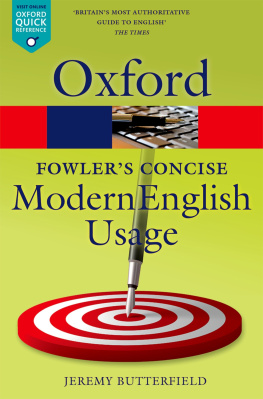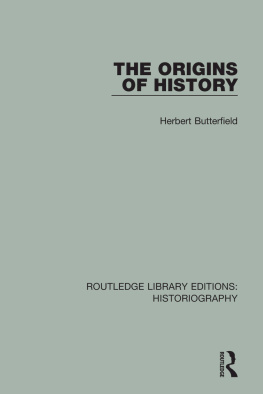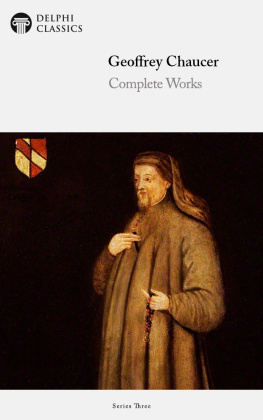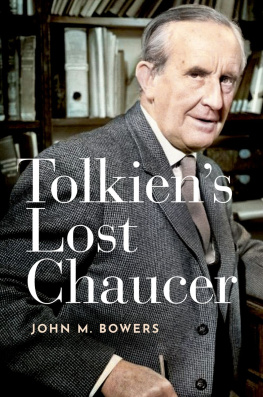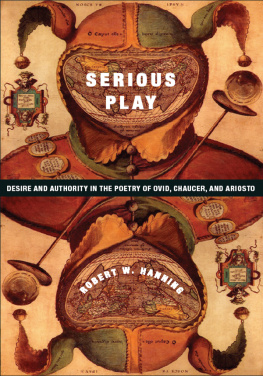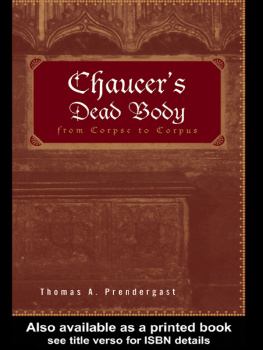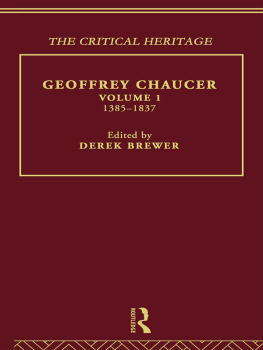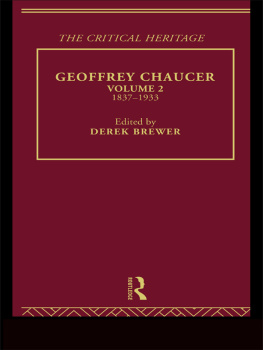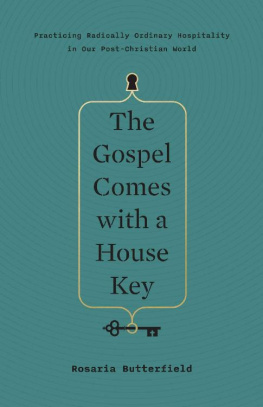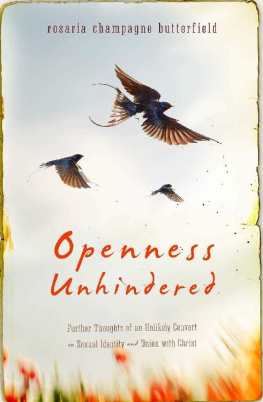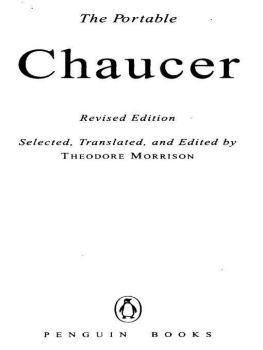Butterfield - The Familiar Enemy: Chaucer, language, and nation in the Hundred Years War
Here you can read online Butterfield - The Familiar Enemy: Chaucer, language, and nation in the Hundred Years War full text of the book (entire story) in english for free. Download pdf and epub, get meaning, cover and reviews about this ebook. City: Oxford, year: 2013;2009, publisher: Oxford University Press USA - OSO, genre: Children. Description of the work, (preface) as well as reviews are available. Best literature library LitArk.com created for fans of good reading and offers a wide selection of genres:
Romance novel
Science fiction
Adventure
Detective
Science
History
Home and family
Prose
Art
Politics
Computer
Non-fiction
Religion
Business
Children
Humor
Choose a favorite category and find really read worthwhile books. Enjoy immersion in the world of imagination, feel the emotions of the characters or learn something new for yourself, make an fascinating discovery.

- Book:The Familiar Enemy: Chaucer, language, and nation in the Hundred Years War
- Author:
- Publisher:Oxford University Press USA - OSO
- Genre:
- Year:2013;2009
- City:Oxford
- Rating:4 / 5
- Favourites:Add to favourites
- Your mark:
- 80
- 1
- 2
- 3
- 4
- 5
The Familiar Enemy: Chaucer, language, and nation in the Hundred Years War: summary, description and annotation
We offer to read an annotation, description, summary or preface (depends on what the author of the book "The Familiar Enemy: Chaucer, language, and nation in the Hundred Years War" wrote himself). If you haven't found the necessary information about the book — write in the comments, we will try to find it.
Butterfield: author's other books
Who wrote The Familiar Enemy: Chaucer, language, and nation in the Hundred Years War? Find out the surname, the name of the author of the book and a list of all author's works by series.
The Familiar Enemy: Chaucer, language, and nation in the Hundred Years War — read online for free the complete book (whole text) full work
Below is the text of the book, divided by pages. System saving the place of the last page read, allows you to conveniently read the book "The Familiar Enemy: Chaucer, language, and nation in the Hundred Years War" online for free, without having to search again every time where you left off. Put a bookmark, and you can go to the page where you finished reading at any time.
Font size:
Interval:
Bookmark:
THE FAMILIAR ENEMY
Chaucer, Language, and Nation in the Hundred Years War
ARDIS BUTTERFIELD


Great Clarendon Street, Oxford 0x2 6DP
Oxford University Press is a department of the University of Oxford.
It furthers the Universitys objective of excellence in research, scholarship,
and education by publishing worldwide
in Oxford New York
Auckland Cape Town Dar es Salaam Hong Kong Karachi
Kuala Lumpur Madrid Melbourne Mexico City Nairobi
New Delhi Shanghai Taipei Toronto
With offices in
Argentina Austria Brazil Chile Czech Republic France Greece
Guatemala Hungary Italy Japan Poland Portugal Singapore
South Korea Switzerland Thailand Turkey Ukraine Vietnam
Oxford is a registered trade mark of Oxford University Press
in the UK and in certain other countries
Published in the United States
by Oxford University Press Inc., New York
Ardis Butterfield 2009
The moral rights of the author have been asserted
Database right Oxford University Press (maker)
First published 2009
All rights reserved. No part of this publication may be reproduced,
stored in a retrieval system, or transmitted, in any form or by any means,
without the prior permission in writing of Oxford University Press,
or as expressly permitted by law, or under terms agreed with the appropriate
reprographics rights organization. Enquiries concerning reproduction
outside the scope of the above should be sent to the Rights Department,
Oxford University Press, at the address above
You must not circulate this book in any other binding or cover
and you must impose the same condition on any acquirer
British Library Cataloguing in Publication Data
Data available
Library of Congress Cataloging in Publication Data
Library of Congress Control Number: 2009935898
Typeset by SPI Publisher Services, Pondicherry, India
Printed in Great Britain
on acid-free paper by
CPI Litho
ISBN 9780199574865
1 3 5 7 9 10 8 6 4 2
For Thomas and Daniel
I owe thanks to many people. My first acknowledgement is to the Leverhulme Trust for awarding me a Research Fellowship in 20034 which enabled the bulk of the primary research to be carried out. Their generous and unpressured support is a model of its kind, and greatly appreciated. It enabled me to work in a range of libraries: principally the Bibliothque nationale de France, site Franois-Mitterand, and the Salle des manuscrits, site Richelieu-Louvois; and at home in London at the UCL Library, the Senate House Library, the Warburg Institute, the Institute for Historical Research, and the British Library. For more specific materials, I gratefully acknowledge the resources and assistance offered at the following libraries: the Bibliothque municipale dArras; the Bibliothque municipale de Lille; the Bibliothque municipale de Valenciennes; the Bibliothque Royale de Belgique in Brussels; the Pierpont Morgan Library in New York; the Rosenbach Museum and Library and the Annenberg Rare Book and Manuscript Library at the University of Pennsylvania, both in Philadelphia; the Charles E. Young Research Library at UCLA, and the Huntington Library in San Marino, California.
Part of as Converting Jeanne dArc: trahison and nation in the Hundred Years War, NML, 8 (2006), ed. Rita Copeland, Wendy Scase, and David Lawton (Turnhout: Brepols, 2006), 6797. Both are reproduced with kind permission.
This book was written mostly in Paris, London, and Connecticut, and more of it than I expected on Eurostar. In Paris, various friends, some long-standing, some newer, offered living and working space, cross-channel conversations, Internet access, food, and company: these include Monique Bergeret, Cathrine Axelrad-Bourget and Jean-Loup Bourget, Andr Crpin, Laura Kendrick, Jean-Pascal Pouzet, Isabelle Ragnard, Luisella and James Simpson, Christina Story, and Cline Surprenant and Jean Demerliac. In Connecticut, Dana English and Tom Whalen, Sam, and Michael offered their warm friendship in a beautiful environment. Much of the immediate stimulus for producing the arguments of the book and the detailed materials to support them came from speaking invitations and the ensuing discussion: I am grateful to colleagues in English, French, and History departments and faculties, in Paris-IV Sorbonne, and LAcadmie des Inscriptions et Belles-Lettres in Paris; in Valenciennes, Lille, Metz, and Geneva; at UCE Birmingham, Cambridge, Exeter, Leeds, Kings College London, Oxford, Reading, York; at Harvard, the ICMS at Kalamazoo, NYU, and Penn; as well as to the New Chaucer Society Congresses in Paris, Glasgow, Fordham University, New York, and Swansea. Their hospitality, wide-ranging knowledge, and diverse approaches have been a rich source of collegiality and intellectual debate. Other occasions for conversation have been provided by the London Old and Middle English Research Seminar, under the stimulating leadership of Ruth Kennedy, with the support of other London colleagues; and also the reading group at Kings College London including at different times Sally Burch, Simon Gaunt, Jane Gilbert, Clare Lees, Bob Mills, Karen Pratt, Luke Sunderland, and Marion Turner. Thanks to Elliot Kendall for doing far more than hold the fort at UCL in my absence, along with other UCL colleagues, especially Susan Irvine, Richard North, Henry Woudhuysen, and Rachel Bowlby. Thanks, too, to Danny Karlin for his interest, and to Philip Horne and Greg Dart for their encouragement. More recently, I owe thanks for offprints and references to Peter Ainsworth, Mary Carruthers, Mark Chinca, Joyce Coleman, Helen Cooper, Bradin Cormack, Philippe Contamine, Jane Gilbert, Tony Hunt, Richard Ingham, Hope Johnston, Sarah Kay, Sjoerd Levelt, Serge Lusignan, Brian Merrilees, Marigold Anne Norbye, Richard North, Bob Yeager, and Nicky Zeeman. More detailed comment on individual chapters was provided by Daron Burrows, Olivier Collet, Godfried Croenen, Yolanda Plumley, Jean-Pascal Pouzet, Craig Taylor, and David Trotter. The generosity of these colleagues in sharing their expertise has been humbling. I am particularly grateful to David Trotter, Daron Burrows, Olivier Collet, and Godfried Croenen for their advice on matters of language. None, of course, is responsible for any errors or vagaries of argument. It is also a pleasure to record thanks to the postgraduates in the UCL Department of English MA in Medieval Literature for their fresh and stimulating approach to the topic of English and Englishness: the Politics of the Vernacular: in particular to Lisa Arsenieva, Neil Dangerfield, Aditi Nafde, Claire Pascolini-Camp-bell, and Ruen-Chuan Ma.
Even greater, I fear unpayable, debts of friendship and scholarship are owed to Kevin Brownlee, Rita Copeland, Susan Crane, Simon Gaunt, Derek Pearsall, James Simpson, Paul Strohm, and David Wallace. Derek, preudomme, with typical largesse and vaillance, read the entire manuscript at a late stage. Fortunately, he liked some of it. Andrew McNeillie did not blink as the manuscript grew longer and longer: for which trust I only hope he is somehow rewarded, perhaps in another life. I am grateful to Kathleen Palti for the scholarly care with which she has helped check through the final draft; and to Shanaz Begum and latterly Julie Miles for their friendship and help with the school run. My family has been extraordinarily patient, always encouraging and understanding especially in the last endless stages of footnoting and checking, and full of distractions when I needed them (and sometimes when I thought I didnt). Thanks to my mother for her intrepid linguistic travels in a very full life, first on her own from Switzerland to England via France, and then with my father across several cultures and continents; to my wonderful brother and his family; to Thomas for his huge support and keen interrogations of my ideas and my prose; and to Daniel (taking after his grandmother) for his inspiring interest in languages. Brian has, of course, I confess, done too much to be thanked as such, but I thank him all the same,
Next pageFont size:
Interval:
Bookmark:
Similar books «The Familiar Enemy: Chaucer, language, and nation in the Hundred Years War»
Look at similar books to The Familiar Enemy: Chaucer, language, and nation in the Hundred Years War. We have selected literature similar in name and meaning in the hope of providing readers with more options to find new, interesting, not yet read works.
Discussion, reviews of the book The Familiar Enemy: Chaucer, language, and nation in the Hundred Years War and just readers' own opinions. Leave your comments, write what you think about the work, its meaning or the main characters. Specify what exactly you liked and what you didn't like, and why you think so.

